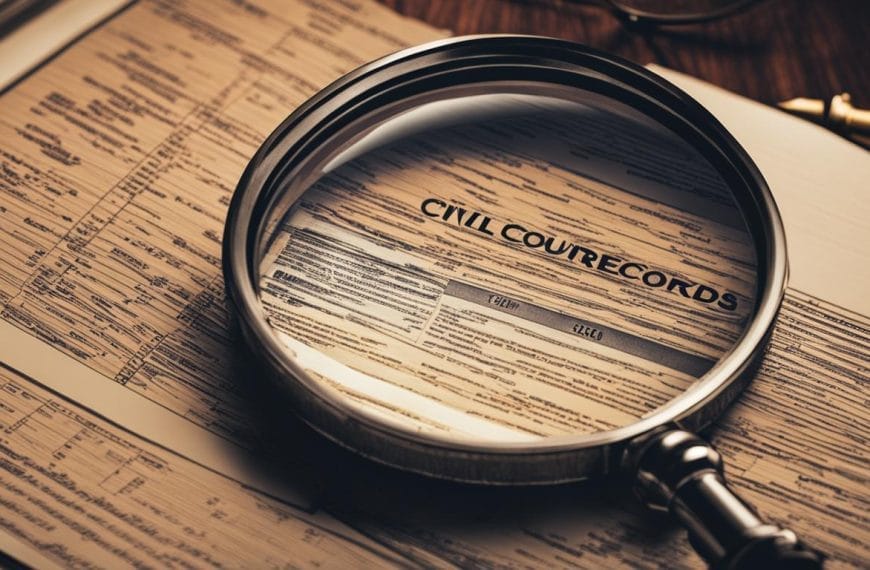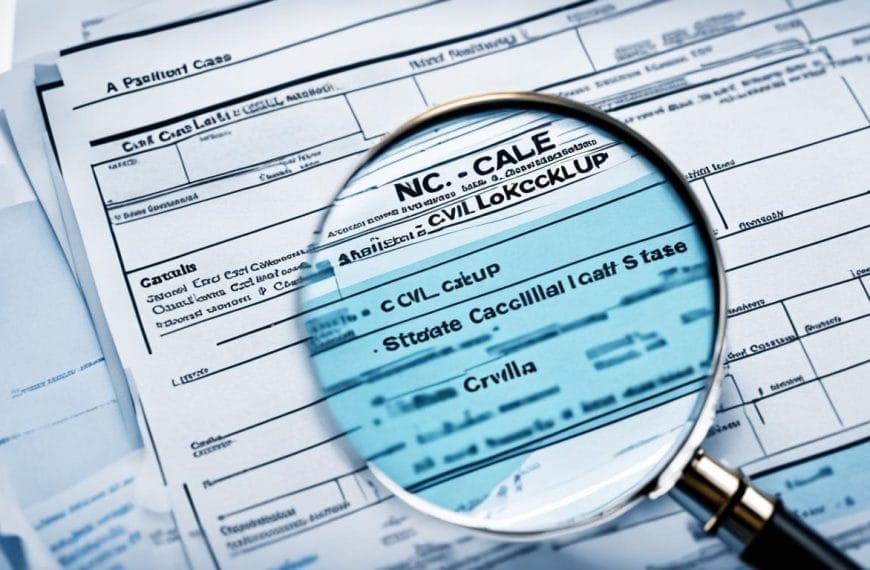Welcome to our article on the NJ Special Civil Part limit in New Jersey. If you’re involved in a civil case in the state, it’s important to understand the special civil part limit, as it can have a significant impact on your case. So, let’s dive in and explore what the special civil part limit entails.
The NJ Special Civil Part limit refers to the maximum amount of money that can be claimed in a special civil case in New Jersey. This limit applies specifically to self-represented litigants who are filing a case in the special civil part of the civil division of the Superior Court.
According to the latest information, the current special civil part limit in New Jersey is $20,000. This means that lawsuits for amounts up to $20,000 can be filed in the special civil part. It’s important to note that there are specific forms and procedures that must be followed when filing a case in the special civil part.
In the following sections, we will discuss how to file a special civil suit, how to defend yourself in a suit, the differences between the special civil part and small claims court, the benefits of the increased special civil part limit, cases suitable for the special civil part, and when to seek legal representation.
So, whether you’re considering filing a case or finding yourself in a special civil suit, this article will provide you with the essential information you need to navigate the special civil part limit in New Jersey.
Filing a Special Civil Suit
To file a special civil suit in New Jersey, there are several steps that need to be followed. Here is a breakdown of the process:
- Determine Your Case: Before filing a special civil suit, you need to clearly define your case and understand the legal basis for your claim. This involves gathering all relevant documents, evidence, and supporting information.
- Complete Special Civil Part Forms: To initiate the lawsuit, you will need to complete the necessary special civil part forms. These forms can be obtained from the New Jersey Judiciary website or the courthouse where your case will be filed. The specific forms required will depend on the nature of your case.
- Pay Filing Fees: When submitting your forms, you will need to pay the required filing fees. The amount of the fees will vary depending on the type and value of your claim. It is important to note that these fees are non-refundable.
- Serve the Defendant: After filing your case, you will need to serve the defendant with a copy of the complaint and summons. This can be done through various methods, such as personal service or certified mail, depending on the rules prescribed by the court.
- Attend Case Management Conference: In some cases, the court may schedule a case management conference to establish deadlines, exchange information, and discuss possible settlement options. It is important to attend this conference and comply with any orders issued by the court.
- Prepare for Trial: If your case proceeds to trial, you will need to prepare your evidence, witnesses, and legal arguments. It is crucial to meticulously organize and present your case to maximize your chances of success.
- Attend Trial: On the scheduled trial date, you will need to appear in court and present your case before a judge. Be prepared to present your evidence, question witnesses, and argue your position persuasively.
- Await Judgment: Once the trial is completed, the judge will render a judgment, either in favor of the plaintiff or the defendant. If you are successful in your case, you may be entitled to damages, restitution, or other legal remedies.
It is important to consult with an attorney or seek legal advice if you are unsure about any aspect of filing a special civil suit. They can provide guidance specific to your case and ensure that you follow all necessary procedures accurately and effectively.
Defending Yourself in a Suit
If you find yourself involved in a special civil case and being sued, it’s important to understand how to defend yourself effectively. Representing yourself in court may seem daunting, but with the right approach, you can navigate the legal process with confidence.
Gather Evidence and Documents
When defending yourself in a suit, it’s crucial to gather and organize all relevant evidence and documents. This includes any paperwork, contracts, receipts, photographs, or other materials that support your defense. Having this evidence readily accessible will help you present a strong case and protect your rights.
Understand the Laws and Rules
Take the time to educate yourself about the laws and rules that govern special civil cases. Familiarize yourself with the applicable statutes, regulations, and court procedures. This knowledge will enable you to better understand your rights, develop strategies, and effectively argue your defense in court.
Prepare Your Defense Strategy
Constructing a solid defense strategy is vital when representing yourself in court. It’s crucial to create a clear and persuasive argument that counters the plaintiff’s claims. Analyze the strengths and weaknesses of your case, and anticipate how the opposing party may present their argument. This preparation will enable you to address any issues or evidence raised during the trial.
Present Your Case Effectively
When defending yourself, it’s essential to convey your message clearly and convincingly. Focus on presenting your defense in a logical and organized manner. Use concise language and avoid jargon or technical terms that may confuse the judge or jury. By effectively communicating your defense, you increase your chances of a favorable outcome.
Consider Legal Assistance
While representing yourself is possible, hiring a lawyer can be advantageous, especially if the case is complex or involves significant damages. If you are unsure about defending yourself or the legal process, seeking professional legal assistance is highly recommended. A lawyer can provide valuable guidance, navigate the intricacies of the law, and significantly enhance your defense.
Defending yourself in a suit can be challenging, but by following these steps and adequately preparing your defense, you can protect your interests and ensure a fair resolution to the case.
{{LINK_TO_HOW_TO_FILE_A_SPECIAL_CIVIL_SUIT}}
{{LINK_TO_SPECIAL_CIVIL_PART_VS_SMALL_CLAIMS_COURT}}
Special Civil Part vs. Small Claims Court
In the state of New Jersey, individuals have two options when it comes to pursuing civil claims: the special civil part and the small claims court. Each court has its own advantages and differences that are important to consider. Let’s take a closer look at the key distinctions between these two options.
Jurisdictional Limit:
The special civil part handles cases with a jurisdictional limit of up to $20,000, while the small claims court is designated for cases with a jurisdictional limit of up to $5,000. This means that if your claim exceeds $5,000 but is below $20,000, you will need to file your case in the special civil part.
Filing Fees:
When it comes to filing fees, the small claims court typically has lower fees compared to the special civil part. This can be advantageous for individuals who want to keep their costs down when initiating a civil claim.
Discovery Process:
Another key difference between the two courts is the discovery process. In the special civil part, the discovery process is more extensive and allows for written discovery requests, depositions, and other methods of obtaining evidence. On the other hand, the small claims court has a simplified discovery process, often limited to presenting evidence during the trial itself.
Time to Reach Trial:
One of the appeals of the small claims court is the relatively quicker timeline to reach a trial date. Cases in the small claims court are typically resolved more expeditiously compared to the special civil part, where the timeline can be longer due to the more complex nature of the proceedings.
To help visualize the differences between the special civil part and the small claims court, refer to the table below:
| Aspect | Special Civil Part | Small Claims Court |
|---|---|---|
| Jurisdictional Limit | Up to $20,000 | Up to $5,000 |
| Filing Fees | Higher | Lower |
| Discovery Process | More extensive, including written discovery requests and depositions | Simplified, often limited to presenting evidence during the trial |
| Time to Reach Trial | Longer | Relatively quicker |
Understanding the differences between the special civil part and the small claims court is crucial in determining the most appropriate course of action for your civil claim. Consider factors such as the amount of your claim, the complexity of the case, and your budget when making this decision. Consulting with a legal professional can also provide you with valuable insights and guidance tailored to your specific situation.
Benefits of Increased Special Civil Part Limit
The recent increase in the special civil part limit in New Jersey has brought about several significant benefits. Firstly, the higher limit allows for more cases to be filed in the special civil part, eliminating the need to navigate the more costly and time-consuming process of the Law Division. Community Associations, in particular, stand to gain from this change as they can now file cases up to $20,000 in the special civil part instead of the Law Division.
One of the immediate advantages of this increased limit is the reduction in filing fees. By filing in the special civil part, litigants can save on expenses associated with filing in the higher courts, making the legal process more accessible and affordable for individuals and organizations.
Another benefit is the quicker scheduling of trials. With more cases being filed in the special civil part, the court is better able to manage its caseload and expedite the resolution of disputes. This means that litigants can expect a faster time frame for their cases to be heard and decided upon.
The increased limit also contributes to a more efficient resolution of cases. By allowing a wider range of claims to be heard in the special civil part, the court can devote its resources to resolving disputes more effectively and without unnecessary delays. This benefits both plaintiffs and defendants, who can reach a resolution more quickly, saving time and money in the process.
Overall, the increase in the special civil part limit in New Jersey has had a positive impact on the legal system. It has made justice more accessible, affordable, and efficient for litigants, particularly for Community Associations seeking to collect judgments. By filing in the special civil part, individuals and organizations can benefit from lower filing fees, quicker trial scheduling, and a more streamlined resolution of their cases.
In the next section, we will explore the types of cases that are suitable for the special civil part and the circumstances in which it is advisable to seek legal representation.
Who Should File in Special Civil Part
The special civil part is well-suited for a range of cases. It is particularly relevant for disputes involving breach of contract, property damage, defective merchandise, bad checks, and the recovery of security deposits, among others. According to the first source, these types of cases are suitable for the special civil part due to its streamlined procedures and accessible process.
However, it is important to note that certain types of cases are not eligible for the special civil part. For instance, malpractice claims, child support or alimony cases, and cases involving wills and inheritance are not within the purview of the special civil part. It is important to be aware of these limitations when determining if your case is suitable for filing in the special civil part.
Examples of Cases Suitable for Special Civil Part:
- Cases involving breach of contract.
- Disputes related to property damage.
- Issues concerning defective merchandise.
- Claims for bad checks.
- Recovery of security deposits.
Examples of Cases Not Eligible for Special Civil Part:
- Medical malpractice claims.
- Child support or alimony cases.
- Cases involving wills and inheritance.
When to Seek Legal Representation
While it is possible to represent yourself in the special civil part, there are certain situations where hiring a lawyer is recommended. If you can afford a lawyer, it is advisable to seek legal representation, as they can provide valuable guidance and increase your chances of a successful outcome.
Benefits of Hiring a Lawyer
There are several benefits of hiring a lawyer for your special civil case. Firstly, lawyers have in-depth knowledge and experience in navigating the legal system, ensuring that all necessary procedures and deadlines are met. They can also provide expert advice on the specific laws and regulations that apply to your case.
Secondly, lawyers can assist in building a strong legal strategy tailored to your case. They can analyze the facts, gather evidence, and present your case in a compelling manner. This can greatly enhance your chances of obtaining a favorable outcome.
Furthermore, having a lawyer by your side can alleviate the stress and burden of handling the legal proceedings on your own. They can handle all communication with the opposing party and their lawyers, allowing you to focus on other aspects of your life.
Lastly, lawyers have negotiation skills that can be invaluable in achieving a settlement. They can negotiate on your behalf to ensure that you receive fair compensation or a resolution that meets your best interests.
Legal Services in New Jersey
If you cannot afford a lawyer, there are legal services available in New Jersey that can provide assistance. Organizations like Legal Services of New Jersey offer free legal representation to eligible individuals who meet their income criteria.
Another option is to seek help from county referral services. These services can connect you with qualified lawyers who offer reduced or pro bono services based on your financial situation.
In conclusion, while self-representation is possible in the special civil part, hiring a lawyer can provide significant advantages. They can offer expertise, strategic guidance, and a higher likelihood of a favorable outcome. If affordability is a concern, exploring free or reduced-cost legal services in New Jersey can be an alternative option.
Conclusion
In conclusion, the NJ Special Civil Part limit in New Jersey has recently been increased to $20,000. This change has significant implications for individuals and Community Associations who are seeking to resolve civil disputes within the jurisdictional limit. The special civil part provides a more accessible and efficient process compared to the higher courts, resulting in a quicker resolution for cases within the limit.
However, it is important to carefully consider the specific circumstances of your case. Seeking legal guidance is advisable to ensure the best possible outcome. Legal professionals can provide valuable expertise and guidance, especially in complex cases involving substantial damages or intricate legal issues.
The recent increase in the special civil part limit allows for more cases to be filed in this part of the civil division of the Superior Court, avoiding the need to file in the higher-cost and lengthier process of the Law Division. This change has particularly beneficial implications for Community Associations, who can now file cases up to $20,000 in the special civil part instead of the Law Division, resulting in lower filing fees, quicker trial scheduling, and a more efficient resolution of the case.













